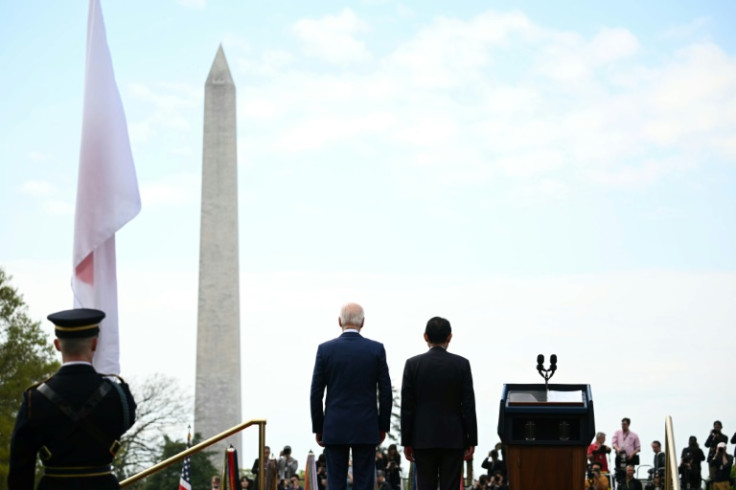Spaceland: Biden Woos Japan PM With Moonshots And Paul Simon

When you want to impress guests it helps to have moon rockets and superstar singer-songwriters on call -- and US President Joe Biden has both.
Biden pulled out all the stops as he hosted Japanese Prime Minister Fumio Kishida for a gala state visit at the White House on Wednesday focused on countering a rising China.
As he sought to build a bridge over the troubled waters of Asia-Pacific geopolitics, Biden made a series of highly symbolic gestures for key ally Kishida.
The Bidens are treating Kishida, his wife Yuko and 200 other guests to a lavish state dinner in the gilt-trimmed East Room of the White House, featuring modern American cuisine with Japanese flavors.
For starters, there is house-cured salmon, avocados, red grapefruit, watermelon radish, cucumber and shisho leaf fritters -- all done in the style of a California roll sushi.
The main course is dry-aged rib eye steak with blistered shishito pepper butter and for dessert there's salted caramel pistachio cake with matcha ganache, cherry ice cream, raspberry drizzle -- with a garnish of cherry blossom petals.
After dinner, legendary folk-rocker Paul Simon -- known for hits including "Sound of Silence" and "Bridge Over Troubled Water" as part of a duo with Art Garfunkel -- will perform a selection of songs for the Kishidas.
The White House said First Lady Jill Biden chose Simon as a tribute because the Japanese premier shared her appreciation for the artist, whose songs as a solo artist also include "Graceland."
Simon's performance in the White House State Dining Room follows a tradition of shows by well-known artists, including Beyonce who performed when President Barack Obama hosted the leader of Mexico in 2010.
Both Biden and Kishida went heavy on the symbolism of cherry blossoms, the evanescent springtime flowers beloved both by the Japanese and Washingtonians.
Japan sent over 3,000 cherry blossom trees to the United States just over a century ago and they still line the US capital's scenic Tidal Basin.
Tokyo will now send another 250 to replace some that are being chopped down in Washington as part of an embankment rehabilitation project.
"Like our friendship, these trees are timeless, inspiring and thriving," Biden said in his welcome speech after a ceremonial arrival that featured a 19-gun salute.
Kishida responded: "I am confident that the cherry blossom-like bond of the Japan-US alliance will continue to grow even bigger and stronger."
The tables for the state dinner will also feature cherry blossom branches, among other flowers.
The two leaders were keen to show US-Japan relations soaring to new heights -- and nowhere was that clearer than Biden's announcement that a Japanese person will be the first non-American to walk on the Moon.
Under NASA's Artemis program, the United States has set a goal of returning humans to the Moon for the first time since 1972.
US-Japan "ties stretch up to the Moon where two Japanese astronauts will join future American missions, and one will become the first non-American ever to land on the Moon," Biden said during a press conference with Kishida.
Only 12 people have walked on the Moon, all of them Americans and all white men.
© Copyright AFP {{Year}}. All rights reserved.




















